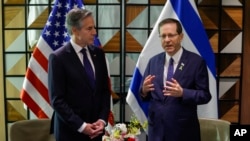U.S. and Israeli efforts to isolate Hamas diplomatically have run up against the reality that a cease-fire and the release of 129 Israeli hostages cannot be achieved without engaging the group responsible for the massacre of some 1,200 people on October 7.
Standing next to U.S. Secretary of State Antony Blinken later in October, Israeli Prime Minister Benjamin Netanyahu said Hamas "should be spit out from the community of nations. No leader should meet them. No country should harbor them. And those that do should be sanctioned."
But almost seven months later, Hamas leaders have neither been ostracized nor have countries that engage with them faced sanctions.
Elusive goal
Last week, Hamas representatives were in Beijing discussing reconciliation with Fatah, another Palestinian faction. A week before that, Hamas leader Ismail Haniyeh met with Turkish President Tayyip Erdogan in Istanbul.
Israel’s frequently stated objective, the complete elimination of Hamas, "is an elusive goal," Ahmed Fouad Alkhatib, a nonresident senior fellow at the Atlantic Council, wrote to VOA.
"It’s simply not an attainable military goal," said Sarah Parkinson, professor of international studies at Johns Hopkins University.
However, weakening Hamas to the point where it is willing to agree to a political solution acceptable to Israel is achievable, some experts say.
"A reformed and evolved Hamas that operates with a platform of peaceful politics could be helpful for sustainable peace," Brian Katulis, an expert at the Middle East Institute, told VOA.
China, US policy
Beijing too has been trying to play a role. But unlike the United States, China does not label Hamas a terrorist group.
Last month, China supported a resolution calling for "the State of Palestine" to have full membership at the United Nations. The United States vetoed the resolution.
China firmly supports "establishing the independent State of Palestine," the absence of which is the root cause of the perpetual crisis Palestine, a spokesperson for the Chinese foreign ministry said last week.
While the U.S. also supports a two-state solution to the long-standing Israel-Palestine dispute, Washington insists that Hamas should not govern a future Palestinian state.
"We are committed, as Israel is, to ensuring that Gaza cannot be controlled by Hamas," Blinken said on April 19.
U.S. officials recognize China's influence in the region and suggest that Beijing should use it constructively.
China "has no interest in a Middle East that’s in flames, full of conflict, and just out of its own self-interest, I think, is looking to take appropriate action," Blinken said.
Despite China’s many interests in the region, its influence pales in comparison to the United States, experts say.
"Most countries in the region still look to the United States as the strategic partner of choice because it offers security support and robust economic and diplomatic engagement," said Katulis of the Middle East Institute.
While the U.S. and China may strive to influence the situation in the Palestinian territories, ending the war in Gaza and charting a path toward a Palestinian state hinge primarily on the decisions of Israel, Palestinians, and other countries in the region.
A senior Hamas leader told The Associated Press last week that the group would quit armed resistance for five years or more if an independent Palestinian state is established on the pre-1967 borders. Hamas charter and subsequent manifestos call for the eventual "liberation" of all the land between the Jordan River and the Mediterranean Sea.
Netanyahu has repeatedly expressed his opposition to the establishment of a Palestinian state, especially one in which Hamas plays a role.




